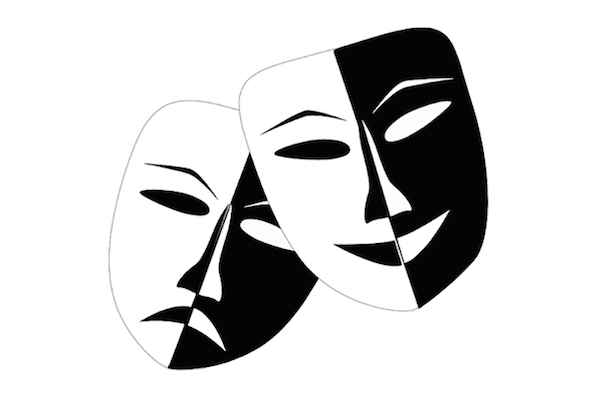
'LaBute New Theater Festival, Part I,' is a thoughtfully constructed theatrical mélange
By Tina Farmer
With submissions from around the country, St. Louis Actors' Studio has quickly established its annual production of original plays, The LaBute New Theater Festival, as a "must see" event for theater fans, and this year is no exception. The St. Louis-based festival is presented in two parts, the first part runs through July 17, 2016 and the second part the following two weekends, with selected pieces to be performed in New York later this year.
Neil LaBute's Life Model, directed by John Pierson, opens part one. The well-constructed script is a humorous piece that begs deeper questions, leading the actors and audience along a twisted path that slowly reveals its intended point. We are introduced to Jenny Smith, as the Artist, and Bridgette Bassa, as the Model, during a break in a sketching session.
A seemingly innocent glance at the work in progress leads to an exploration of art and commerce that pushes each character to defend her value. Suggestions of perversity are countered by accusations of artistic prostitution, although the question at the core of the piece remains, "What defines an artist?" LaBute's dialogue is sharp, transitioning from casual conversation to uncomfortable battle and uneasy resolution, with clear direction and bristling performances.
Sans Matches, by Jeff Carter and directed by Pierson, slides insidiously into your head while entertaining with cleverly realistic dialogue and characters fully immersed in the day-to-day drama of contemporary life. Emily Baker and Eric Dean White are the yin and yang parents of Jeremy Pinson, a typical American teen. There's a perfected air of indifferent annoyance between the family members. Though each character has a few secrets they hide, the trouble with this family is familiarity not dislike.
The three are struggling to enjoy a picnic in the woods outside a major city when their mindless bickering is spectacularly interrupted. Suddenly, a show about a family just trying to get along ends with an environmental catastrophe and, with a splash of irony, we are reminded how small the battles and how careless the actions of mankind really are.
Winter Break, by James Haigney, directed by Michael Hogan, is another play about contemporary issues, as it confronts religious freedom and its impact on the prototypical American family. Directed with an eye for body language that heightens conflict, the show pushes some comfort buttons as a young woman from a moderate protestant family defends her decision to travel to the Mideast and continue her conversion from Christian to Muslim. Smith, Leerin Campbell, and Ryan Scott Foizey turn in compelling performances, creating sympathetic characters that refuse easy analysis, though the dialogue could use some focus and clarity. The show is filled with tension from the first movement, and the resolution is layered with confusion, hesitation, and the unwavering love of parents for their children.
Cary Pepper's Mark My Worms, directed by Hogan and the closing piece in part one, is a hilariously absurd play that examines ideas of artistic expression and merit. David Wassilak is a director attempting to mount a newly discovered play from a celebrated, but deceased, playwright featuring actors White and Baker. The playwright's estate insists that the script must be performed exactly as presented, though it is clearly riddled with typos.
Together, the three wrestle over meaning, interpretation and fame, leading the audience to question whether it was typos, rather than genius, that led to the author's success. The three actors are clearly comfortable playing with the genuinely absurd dialogue, and director Hogan gives them reign without losing site of the destination. The physicality of their interpretations is matched with line after line of ridiculously plausible but illogical dialogue, once White and Baker get going the effect is electrifying, silly, and effective.
Just four seasons into the festival, the event attracts high quality scripts from a wide variety of playwrights that touch on common, contemporary themes. The shows are also presented in an order that, with a nod to the selection and production teams, creates a satisfying dramatic arc. Patrick Huber's set and lighting design serve all the shows well while enabling quick set changes under the direction of stage manager Amy J. Paige and her efficient crew.
The four pieces of St. Louis Actors' Studio's LaBute New Theater Festival: Part I, running through July 17, 2016, are an engaging and well-positioned slate of short plays. Directors Pierson and Hogan show a deep appreciation for the original scripts, leading the actors with confidence and exploiting the theater's small space. The resulting production is fast-paced and interesting, with compelling, motivated performances that ensure a thoroughly enjoyable, provocative, and at times laugh out loud funny evening.


